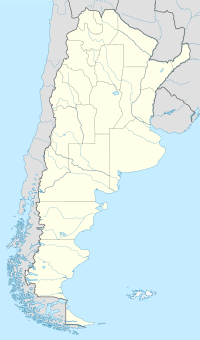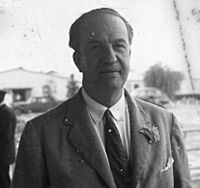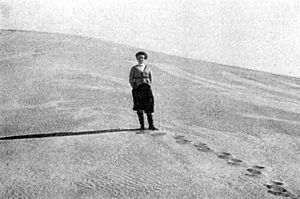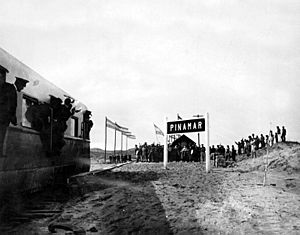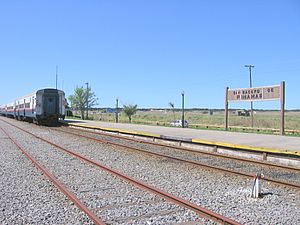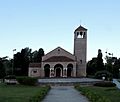Pinamar facts for kids
Quick facts for kids
Pinamar
|
|
|---|---|
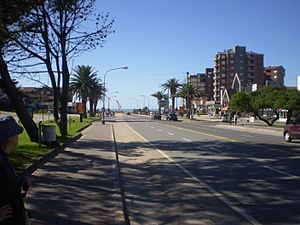
Avenida Bunge in 2008
|
|
| Country | |
| Province | |
| Partido | Pinamar |
| Founded | February 14, 1943 |
| Elevation | 17 m (56 ft) |
| Population
(2020)
|
|
| • Total | 45,000 |
| CPA Base |
B 7167
|
| Area code(s) | +54 2254 |
Pinamar is a beautiful city on the coast of Argentina. It's located right on the Atlantic Ocean in Buenos Aires Province. About 45,000 people live here (as of 2020).
Pinamar is less than 400 kilometers (about 250 miles) south of Buenos Aires. It's one of many small towns along the coast. Since the ocean is the main reason people visit, Pinamar is usually quiet in winter. But in summer, it becomes a lively place, and tourism helps the local economy a lot.
Other coastal towns are very close to Pinamar. If you travel south, you'll find Ostende, Valeria del Mar, and Cariló.
Pinamar is special for two main reasons. First, it was carefully planned out before it was built. It has strict rules about how buildings should look. Second, it used to be wild sand dunes. But people worked hard to turn it into a forest, mostly with pine trees. This is why it's called "Pinamar"—"pina" means pine in Spanish!
The city's design was created by an architect named Jorge Bunge. He wanted a city with many houses and open gardens. This plan has been followed by leaders ever since. Planting pine trees first started in Cariló, a nearby town. Pinamar copied this idea, but its city plan was kept much more carefully over the years.
Contents
Pinamar's Past: How the City Began
In the 1800s, the area where Pinamar is now was mostly a desert. It had many dunes facing the sea. These dunes were part of a large property called "Los Montes Grandes de Juancho." This land belonged to Don Martín de Alzaga.
In 1907, a train station called Juancho opened nearby. It was built by the Buenos Aires Great Southern Railway. This station was the end of a train line from General Guido. Visitors started coming to the area by train. From Juancho station, they would take horse-drawn carriages to the towns.
In the late 1930s, an architect named Jorge Bunge had a big idea. He teamed up with Valeria Guerrero, who owned the land. She was related to the original landowners. Bunge created a unique city design. He drew streets with curves and loops to fit the natural dunes. He wanted to plant trees to hold the dunes in place and then build a city.
Bunge had studied architecture and city planning. He started a company called "Pinamar S.A." with Valeria Guerrero and Franco Moschella. Many other people joined them. They were excited to take on the challenge of building a city in this sandy area.
In 1940, they began planning and building basic things. A year later, they started planting trees on a large scale. They used new ways to fix the dunes. By 1942, they began building the city itself. They made more roads and built houses for the company's workers. They also studied the area's weather and natural features. This information helped them create a master plan for the city.
On February 14, 1943, Pinamar officially opened as a beach resort. The "Playas Hotel," an Electric Plant, and a small shopping center were built. They kept planting trees to stabilize the dunes. Land was given to build a school, a first aid center, a civic center, a police station, and a church. A factory was also built to make building materials. The main road, Route 11, was finished.
In 1944, the master plan for Pinamar was approved by the Province of Buenos Aires. More main streets were paved. Electricity and running water systems were put in place. In 1945, the first land lots were sold. People started building permanent homes and summer houses. That same year, the first golf course, the school, the first aid center, the Church of Our Lady of Peace, and the original pier all opened.
In 1948, all the railways in Argentina became government-owned. The railway company decided to use old freight lines for passenger trains to Pinamar. After some planning, the first train service from Constitución to Pinamar opened in August 1949. The Pinamar station was located where a park is today.
These first trains were special railcars. The train service ran for 18 years. It finally closed on December 12, 1967. The train tracks were removed in the 1970s.
Jorge Bunge passed away in 1961. A year later, a telephone cooperative was started. On July 1, 1978, the "Pinamar Partido" was created. This meant Pinamar became its own independent area, separate from General Madariaga. The Pinamar Partido includes Pinamar, Ostende, Valeria del Mar, and Cariló.
In 1991, the Governor of Buenos Aires Province, Eduardo Duhalde, wanted to bring back train services. He planned to extend the train line to Pinamar. Trains to General Madariaga started again in May 1994.
Between 1994 and 1996, new tracks were built from General Madariaga to Pinamar. A new station called "Divisadero de Pinamar" was built. This new station is about 1.5 km (almost 1 mile) from Route 11. It was built further away from the city than the old station to avoid a busy road crossing. Divisadero de Pinamar station opened on December 7, 1996.
Pinamar's Weather
Pinamar has a mild climate, which means it doesn't get too hot or too cold. Summers are warm, and winters are cool. It rains throughout the year, but some months are wetter than others. The humidity is usually moderate.
Getting Around Pinamar
Pinamar was one of the first cities on the Argentine Atlantic Coast to have a train service. The first Pinamar station opened in 1949. This service ran for 18 years before closing in 1967.
Today, you can still reach Pinamar by train. You can take a train from Constitución station to Divisadero de Pinamar station. This station opened in 1996. From there, you can take a bus to the city, which is about 2 kilometers (1.2 miles) away.
The main bus terminal in Pinamar is located on Avenida Ingeniero Budge and Del Bosque.
Fun Facts About Pinamar
On July 2, 2019, something amazing happened in Pinamar. It was the first time a total solar eclipse was watched by webcam from below the horizon. This happened during the 2019 total solar eclipse.
Images for kids
Sister Cities
See also
 In Spanish: Pinamar para niños
In Spanish: Pinamar para niños


